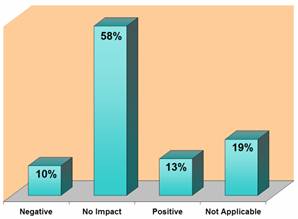The crime nearly all local law enforcement agencies cited as the most critical for federal involvement was identity theft. The nature of this crime often places the victim and offender in separate geographical jurisdictions – different cities, different states, or even different countries. Additionally, many identity theft offenses are technically complex and exceed the abilities of local law enforcement to successfully investigate. Taken together, these jurisdictional and technical impediments generally affect local law enforcement agencies’ ability to address identity theft offenses.
In testimony before the U.S. Senate Judiciary Committee on April 13, 2005, the FBI’s Assistant Director for the Criminal Investigative Division stated that “Identity theft has emerged as one of the dominant white-collar crime problems of the 21 st Century.” In this same hearing, he commented that identity theft usually is not a singular crime; normally it is associated with other thefts or frauds, such as mortgage fraud and health care fraud. Moreover, he stated that identity theft crimes are normally perpetrated via the Internet. These factors make identity theft a complex crime to investigate.
Many law enforcement officials we interviewed said that identity theft has become a major crime problem affecting their constituents. For example, representatives from several local police departments in Arizona, including the Mesa Police Department and Tucson Police Department, listed identity theft as one of their predominant crime problems and the officials expected continued increase in such incidents. Officials from the Miami-Dade County, Florida, Police Department remarked that identity theft is “out of control” in South Florida. Los Angeles County, California, Sheriff’s Department officials stated identity theft has become a significant, high-profile crime problem over the past 4 years.
Several local police agency representatives noted the need for a national plan to combat identity theft; a plan they said must come from the federal government. In particular, Miami-Dade County, Florida, Police Department officials stated that a void exists in law enforcement’s response to this crime and that a federal agency needs to assume a larger role in combating this problem.
Identity theft has only recently become recognized as a major crime matter. Therefore we cannot assess the impact on identity theft investigations resulting from the FBI’s shifting of priorities and resources. According to FBI data, the FBI opened 36 cases that were strictly identity theft matters in FY 2004 and utilized 2.5 on-board agents to specifically address identity theft issues in FY 2004; statistics are not available for FY 2000 because the FBI had not yet created a specific subprogram for identity theft. However, as previously stated, identity theft is often part of larger fraud schemes and the FBI may have been involved in many more identity theft investigations through cases tracked under different investigative classifications, like health care fraud or bank fraud. FBI officials provided the OIG with a report that presented the number of pending FBI investigative cases with an identity theft link. During FY 2004, the total number of such pending cases was nearly 900 for the entire FBI, including its legal attaché offices.
Some FBI offices participate in identity theft task forces, such as the Chicago Metropolitan Identity Fraud Task Force. This task force includes local, state, and federal law enforcement agencies, as well as representatives from the private sector, such as the banking industry. In addition, the FBI participates on the Southern California High Technology Task Force led by the Los Angeles County, California, Sheriff’s Department, which focuses on identity theft.
Need for Federal Strategy on Identity Theft
The survey results indicated that the majority of responding state and local law enforcement agencies had been minimally affected in the area of identity theft as a result of the FBI’s reprioritization. Specifically, only 10 percent of the respondents noted a negative impact on their agencies investigative efforts in identity theft matters resulting from the FBI’s reprioritization. Exhibit 9‑1 is a graphical representation of the survey results.
| EXHIBIT 9-1
SURVEY RESULTS OF THE IMPACT ON STATE AND LOCAL LAW ENFORCEMENT AGENCIES’ IDENTITY THEFT INVESTIGATIONS |
|---|
 |
| Source: OIG analysis of survey responses |
Many law enforcement agencies are involved in identity theft investigations, such as the U.S. Postal Inspection Service (USPIS), U.S. Secret Service, ICE, and local police and sheriff departments. However, few local police departments consider themselves capable of investigating many identity theft cases. For example, officials at several local agencies in the Miami area explained that these crimes often surpass their agencies’ expertise. Some of these officials remarked that their departments can address a few of these incidents but not the massive number of such violations that occur. They believed that the involvement of the federal government is crucial to fighting this growing crime problem.
Moreover, with several different federal agencies investigating identity theft cases, local law enforcement officials said they are, at times, confused about which agency to turn to for assistance. Overwhelmingly, local law enforcement agencies conveyed the need for the development of a federal strategy to combat identity theft at all levels of law enforcement.


